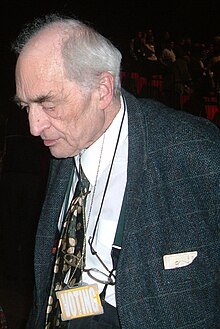This article needs additional citations for verification. (January 2010) |
The Earl Russell | |
|---|---|
 Lord Russell at the Liberal Democrat Federal Conference in Brighton, September 2003 | |
| Member of the House of Lords | |
| as a hereditary peer 16 December 1987 – 11 November 1999 | |
| Preceded by | The 4th Earl Russell |
| Succeeded by | Seat abolished |
| as an elected hereditary peer 11 November 1999 – 14 October 2004 | |
| Election | 1999 |
| Preceded by | Seat established |
| Succeeded by | The 10th Earl of Glasgow |
| Personal details | |
| Born | 15 April 1937 Harting, West Sussex, England, UK |
| Died | 14 October 2004 (aged 67) London (Park Royal), England, UK |
| Political party | Liberal Democrats (1988–2004) |
| Other political affiliations | Labour Liberal |
| Spouse |
Elizabeth Sanders
(m. 1962; died 2003) |
| Parent(s) | Bertrand Russell Patricia Spence |
| Alma mater | Oxford University |
| Occupation | Politician, historian |
| Profession | Academic |
Conrad Sebastian Robert Russell, 5th Earl Russell, FBA (15 April 1937 – 14 October 2004), was a British historian and politician. His parents were the philosopher and mathematician Bertrand Russell and his third wife Patricia Russell. He was also a great-grandson of the 19th-century British Whig Prime Minister Lord John Russell.[1] He succeeded to the earldom on the death of his half-brother, John Russell, on 16 December 1987. Both sons were named after their father's great friend Joseph Conrad, who was also the 4th Earl's godfather.
Educated at Eton (King's Scholar) and Merton College, Oxford,[2] Conrad Russell was an academic historian working on 17th-century British history, having extensively written and lectured on parliamentary struggles of the period. Russell was also a passionate advocate of liberalism, from a long family line of distinguished liberals.
After his death from complications of emphysema, Russell was succeeded as Earl by his elder son, Nicholas, who died in 2014 and was succeeded as Earl by his brother, John, who is also a politician.
- ^ Andrew Phillips. "Obituary: Earl Russell | Politics". The Guardian. Retrieved 9 January 2017.
- ^ Levens, R. G. C., ed. (1964). Merton College Register 1900-1964. Oxford: Basil Blackwell. p. 471.